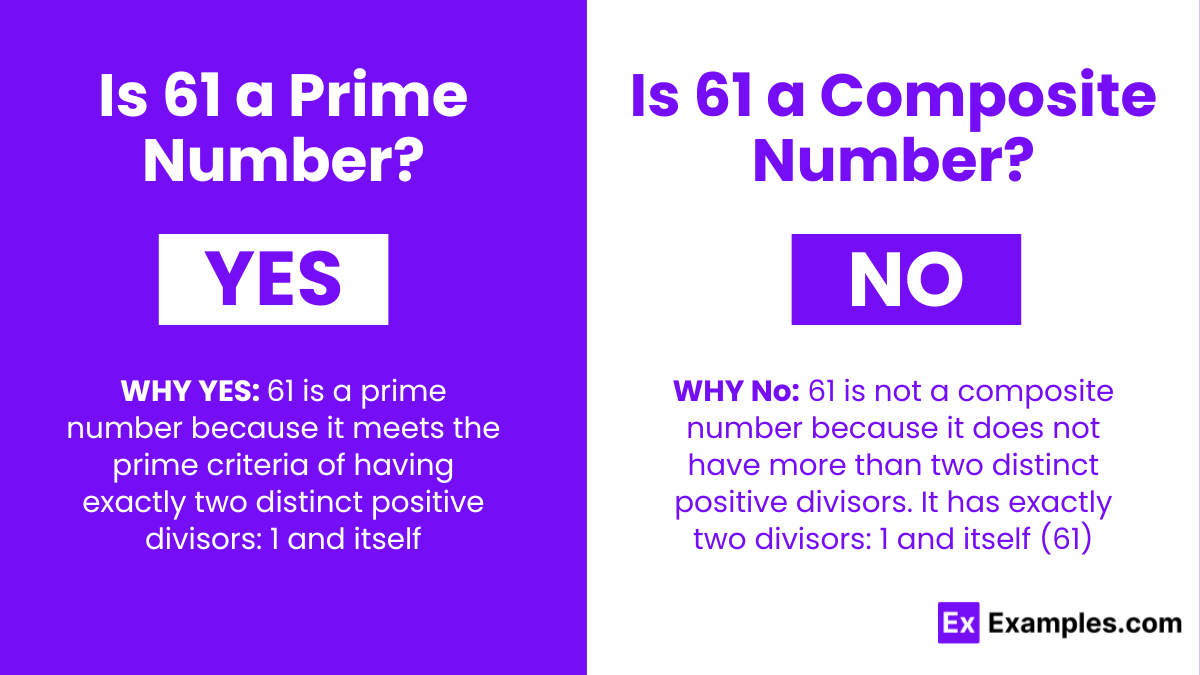Is 61 a prime number or a composite number?
Prime
Composite
Neither
Both


Why Yes: 61 is a prime number because it meets the prime criteria of having exactly two distinct positive divisors: 1 and itself. The only divisors of 61 are 1 and 61, making it a prime number. See any number if it’s prime number or not
Why No: 61 is not a composite number because it does not have more than two distinct positive divisors. It has exactly two divisors: 1 and itself (61), making it a prime number, not a composite one.
| Property | Answer |
|---|---|
| Is 61 a prime number? | Yes |
| Is 61 a composite number? | No |
| Is 61 a perfect square? | No |
| Factors of 61 | 1, 61 |
| Multiples of 61 | 61, 122, 183, 244, 305, 366, 427, 488, 549, 610 |
| Cube Root of 61 | Not a whole number |
| Square of 61 | 3721 |
| Square Root of 61 | 7.810 |
| Is 61 a Perfect Cube? | No |
| Is 61 an Irrational number | No |
| Is 61 a Rational number | Yes |
| Is 61 a Real number | Yes |
| Is 61 an Integer | Yes |
| Is 61 a Natural number | Yes |
| Is 61 a Whole number | Yes |
| Is 61 an Even or odd number | No (61 is an odd number) |
| Is 61 an Ordinal number | Yes |
| Is 61 a Complex number | Yes (as all real numbers are also complex numbers) |
The factors of 61 are 1 and 61. This is because 61 is a prime number, meaning it only has two distinct positive divisors: itself and 1.
61 is recognized as a prime number because it has exactly two distinct positive divisors: 1 and itself, specifically 1 and 61. This distinguishes it from composite numbers, which have more than two divisors. Although the number 61 may not be as widely associated with harmony or spiritual significance in various cultures as some numbers, it serves as a reminder of the diversity and significance of numbers in mathematics. Its status as a prime and odd number underscores the variety of numerical properties and their applications in different fields, highlighting the integral role of mathematics in exploring and understanding the world around us.
The nearest prime numbers to 61 are 59 and 67. 59 is the prime number just before 61, and 67 is the prime number just after 61.
The fastest method to find prime numbers depends on size; for small numbers, the Sieve of Eratosthenes is efficient, while the Miller-Rabin test is better for large numbers, offering quick probabilistic assessments.
No, 61 is not a perfect square. A perfect square is an integer that is the square of an integer, and there is no integer whose square equals 61.
The prime factors of 61 are simply 61 itself, because 61 is a prime number. A prime number has no prime factors other than itself and 1.
Text prompt
Add Tone
10 Examples of Public speaking
20 Examples of Gas lighting
Is 61 a prime number or a composite number?
Prime
Composite
Neither
Both
What type of number is 61?
Even
Odd
Prime
Composite
Which of the following correctly describes 61?
Composite
Prime
Both
Neither
Is 61 a prime number?
Yes
No
Sometimes
None
Which of the following numbers is a factor of 61?
1
2
3
5
What is the smallest prime number greater than 61?
67
61
73
59
Which statement is true about 61?
It is a composite number.
It is divisible by 2.
It has exactly two distinct positive divisors.
It is divisible by 3.
What is the difference between 61 and the nearest prime number less than it?
2
4
6
8
What is the result of dividing 61 by 1?
60
61
1
62
Which of these numbers is a prime number?
61
62
64
66
Before you leave, take our quick quiz to enhance your learning!

